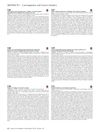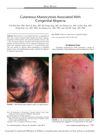 May 2011 in “Value in Health”
May 2011 in “Value in Health” CP-690,550 significantly reduced itching in patients with moderate-to-severe plaque psoriasis.
 December 2024 in “International Journal of Drug Delivery Technology”
December 2024 in “International Journal of Drug Delivery Technology” A gel with dutasteride and 10% garlic extract may effectively treat male pattern baldness.
 December 2024 in “Molecules”
December 2024 in “Molecules” Bovine milk-derived exosomes may improve skin, hair, gut, brain, and bone health.
 August 2024 in “Drug Design Development and Therapy”
August 2024 in “Drug Design Development and Therapy” Decursin shows promise for treating cancer, neuroprotection, inflammation, and hair loss.
 July 2024 in “Science and Culture”
July 2024 in “Science and Culture” Thuja orientalis L. has many health benefits and could be used in new medicines.
March 2024 in “Cosmetics” New regenerative techniques show promise for improving skin, healing wounds, and growing hair.
 March 2024 in “Stem cell research & therapy”
March 2024 in “Stem cell research & therapy” Human dental pulp stem cell-conditioned medium, especially from hypoxic conditions, may help treat chemotherapy-induced hair loss and does not increase cancer risk.
 January 2024 in “Biological & clinical sciences research journal”
January 2024 in “Biological & clinical sciences research journal” Apigenin, found in plants and vegetables, has many health benefits, including anti-inflammatory, antioxidant, and anticancer effects.
 December 2023 in “Scientific Reports”
December 2023 in “Scientific Reports” Scientists created cell lines from balding patients and found that cells from the front of the scalp are more affected by hormones that cause hair loss than those from the back.
 August 2022 in “International journal of research in pharmacy and chemistry”
August 2022 in “International journal of research in pharmacy and chemistry” Teak is a durable, termite-resistant wood with medicinal benefits.
 April 2018 in “Journal of Investigative Dermatology”
April 2018 in “Journal of Investigative Dermatology” Higher levels of nidogen1 and type IV collagen are found in basal cell carcinoma compared to normal skin.
 April 2018 in “Journal of Investigative Dermatology”
April 2018 in “Journal of Investigative Dermatology” The document concludes that ERBB2 mutations are common in extramammary Paget disease and may respond to systemic treatments like cancer immunotherapy.
 February 2016 in “Aktuelle Dermatologie”
February 2016 in “Aktuelle Dermatologie” Low-Level Laser Therapy significantly improves hair density in women with hormonally and age-related hair loss.
 May 2015 in “Hair transplant forum international”
May 2015 in “Hair transplant forum international” The article concludes that PRP might help with hair loss, but more detailed research is necessary.
March 2023 in “Medical lasers” Low-level laser therapy is a safe and effective treatment for hair loss.
 67 citations,
November 2019 in “Molecules”
67 citations,
November 2019 in “Molecules” Tea, especially green tea, shows promise in cosmetics for skin and hair benefits but more research is needed for effective use.
 32 citations,
March 2021 in “Journal of endocrinological investigation”
32 citations,
March 2021 in “Journal of endocrinological investigation” Thyroid hormones are important for skin health and changes in them can affect conditions like hair loss and eczema.
 11 citations,
August 2018 in “Facial Plastic Surgery Clinics of North America”
11 citations,
August 2018 in “Facial Plastic Surgery Clinics of North America” Adipose-derived stem cells show potential for skin rejuvenation and wound healing but require more research to overcome challenges and ensure safety.
5 citations,
March 2022 in “Frontiers in Medicine” PRP is effective for treating hair loss, especially with other treatments.
 3 citations,
February 2012 in “The American Journal of Dermatopathology”
3 citations,
February 2012 in “The American Journal of Dermatopathology” A 3-year-old girl with skin mast cell buildup and congenital baldness improved with treatment, suggesting a rare link between these conditions.
 February 2024 in “International Journal of Molecular Sciences”
February 2024 in “International Journal of Molecular Sciences” Hair loss in Androgenetic Alopecia is caused by genetics, aging, and lifestyle, leading to hair follicle shrinkage and related health risks.
 May 2017 in “bioRxiv (Cold Spring Harbor Laboratory)”
May 2017 in “bioRxiv (Cold Spring Harbor Laboratory)” The peach gene pCTG134 helps control the interaction between auxin and ethylene hormones during fruit ripening.
 14 citations,
January 2008 in “Gene therapy”
14 citations,
January 2008 in “Gene therapy” Gene therapy shows promise for enhancing physical traits but faces ethical, safety, and regulatory challenges.
42 citations,
April 2021 in “JCI insight” Blocking JAK3 signaling can reverse hair loss from alopecia areata.
 4 citations,
March 2023 in “Current Oncology”
4 citations,
March 2023 in “Current Oncology” Scalp cooling is the only FDA-approved method to prevent hair loss from chemotherapy, but other treatments like minoxidil and PRP are being tested.
3 citations,
December 2023 in “Biomedicines” PRP therapy helps skin heal and improve by promoting cell growth and repair.
 April 2016 in “Journal of Investigative Dermatology”
April 2016 in “Journal of Investigative Dermatology” Double-stranded RNA activates a pathway that causes a skin protein to be expressed in the wrong place.

Androgenetic alopecia, or hair loss, is caused by genetic factors and hormones, with different mechanisms in men and women, and can be linked to insulin resistance and polycystic ovary syndrome.
69 citations,
May 2009 in “Journal of Investigative Dermatology” Stress might contribute to hair loss in alopecia areata.
 5 citations,
October 2020 in “Journal of radiation research”
5 citations,
October 2020 in “Journal of radiation research” Vesicles from irradiated mouse cheek skin help cells survive radiation.























